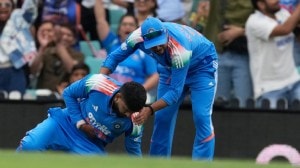Government, Maoist talks make no headway
Maoist chief Prachanda chose rhetoric over a categoric answer when asked if he was ready for separation of arms and combatants to ensure a free and fair election to the constituent assembly.

Maoist chief Prachanda chose rhetoric over a categoric answer when asked if he was ready for separation of arms and combatants to ensure a free and fair election to the constituent assembly.
As a result, the second round of fresh talks between the top level leaders of the ruling seven-party coalition and the Maoists on Tuesday yielded nothing more than the resolve to meet again on Thursday.
Although both sides had agreed on Sunday itself to hold election to the constituent assembly by June, the related issues like management of arms of the rebels—an essential condition for free and fair poll—could not be sorted out as Prachanda kept reiterating that “our arms will not be an obstacle in the peace process”. He refused to be categoric when Prime Minister G P Koirala asked him for his assurance on the arms issue being settled before the election to the constituent assembly.
A senior leader of the Nepali Congress said what Prachanda did was contrary to the assurance he had given to Koirala in private that if there was any symbolic gesture on the part of the Nepal Army to have a “part of its arms put in the barrack, the Maoists would be ready to deposit at least 50 per cent of the arms they had”.
Krishna Sitaula, convener of the government negotiating team, and Krishna Bahadur Mahara, convener of the Maoist team, later said they have been assigned to put forward the agenda for Thursday’s meeting. Both the leaders described the meeting as “positive”, but did not have much to say in substantiation.
The government, according to another participant of the meeting which lasted nearly seven hours, would be appointing the new election commission in a week’s time to start the process for election to the constituent assembly.
Despite the hope that the meeting on Sunday had generated after both sides agreed to go for poll to the constituent assembly by June leaving it to decide the fate of the monarchy, the failure of both sides to resolve the contentious issues today leaves the peace process as bleak as it was.



- 01
- 02
- 03
- 04
- 05




























